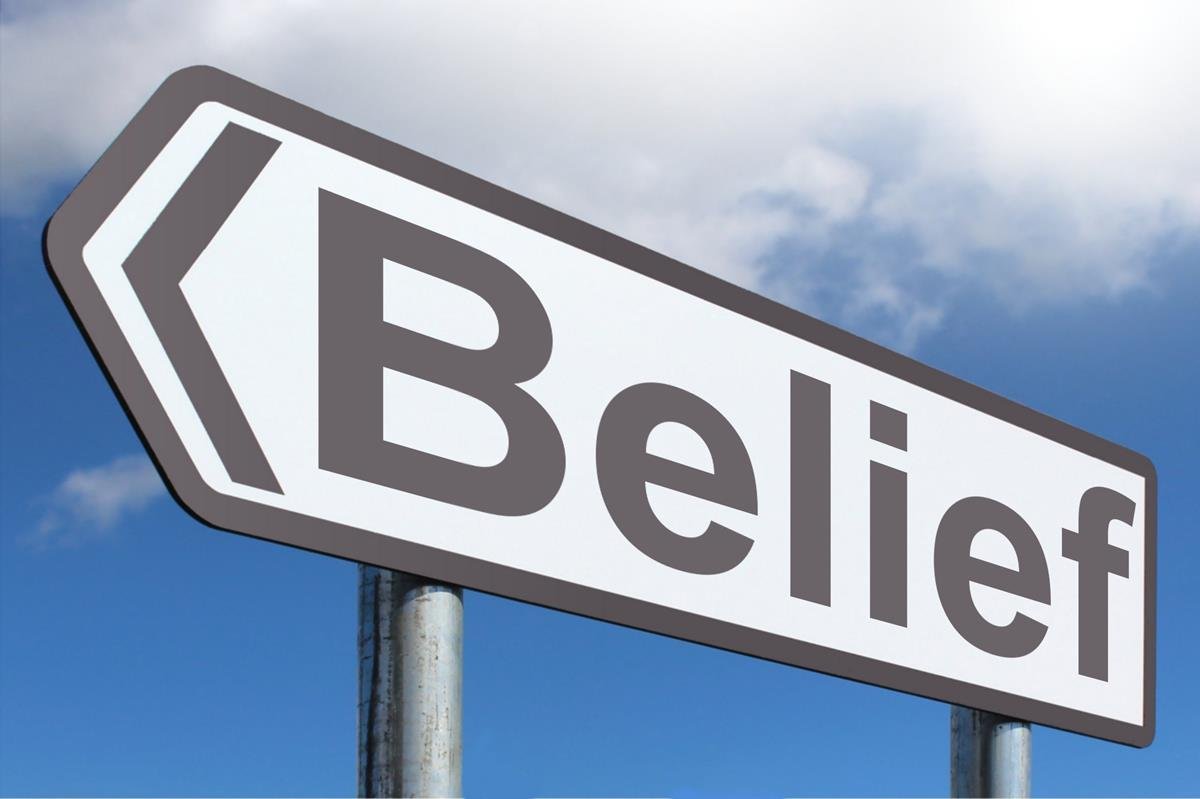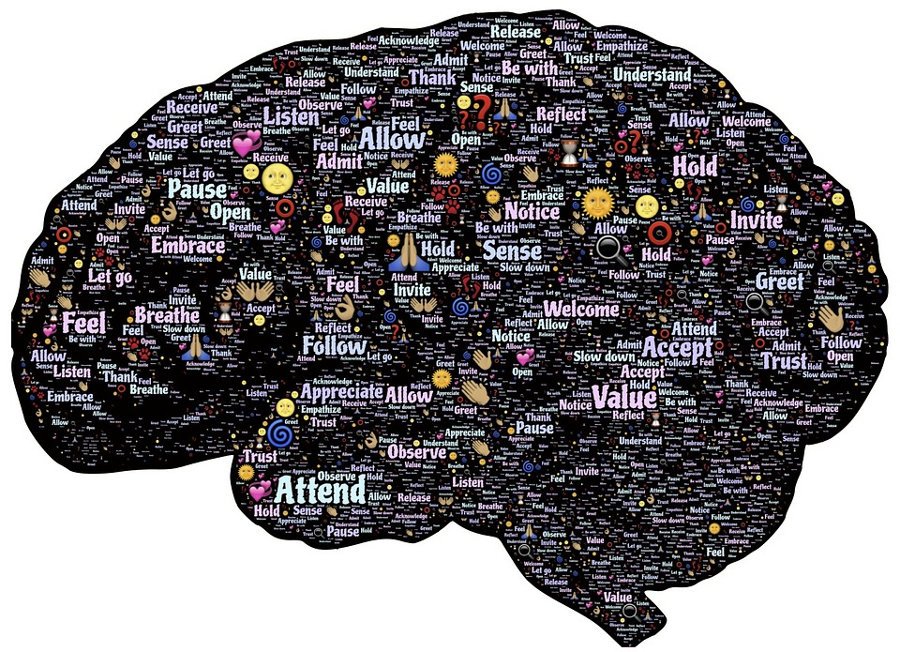Because our beliefs affect the way we behave. Belief is not just the belief in a God or Santa Claus, but simple things; someone who believes dogs are dangerous, for whatever reason, will do their best to avoid these four-legged best friends.

image by Nick Youngson - source: Creative Commons
Maybe you were thought all dogs are dangerous by your parents, maybe you were bitten by a dog or dogs as a kid; it has left you with a deep conviction that dogs are to be avoided. A deeply rooted belief in modern western society is the belief that one needs to be rich to be really happy. The whole capitalist economy is based on that belief and we're all spending great parts of our time and energy acting out that belief.
A belief, for this conversation, is something we consider to be true. Many beliefs are so deeply rooted in our subconscious minds that they steer our behavior. I recently wrote in this post that some Christians refuse medical treatment or vaccines because they believe it would be against God's Will. Our beliefs are the mirror in which we reflect the outside world; they shape our opinions about ourselves and others, what we think is good or bad, who is nice and who we don't like so much.
Beliefs are formed in different ways, through experience, through deduction or simply because someone we find trustworthy told us something is true. Now, when we're honest, most of our beliefs come from listening to some sort of authority on a subject, our teachers and our parents. It's important to note that most of our deepest convictions, our core beliefs, are formed at a young age. I hate to single out Christianity again, but this is why their 4/14 Window Movement exists; they know 4 to 14 are the years we are most accepting of any truth told to us.
It focuses on the 4/14 window which centers on evangelizing children between the ages of 4 and 14 years.[1] Children are targeted because they are the "most receptive, but also because they are often the most effective agents for mission" to evangelize their peer group. Groups supporting the evangelization initiative have argued that "It is crucial that mission efforts be reprioritized and re-directed toward the 4/14 age group world-wide"
source: Wikipedia

source: Max Pixel
Most of our core beliefs about the nature of the world and life are given to us at a very young age, in a time when we're not yet capable of separating truth from falsehoods or fantasies. A well known Dutch neuropsychologist described this as follows, and I'm paraphrasing because I don't remember his exact words, and he also used "Sinterklaas" and not "Santa Claus":
"The only difference between believing in God and believing in Santa Claus is that in the case of the latter your parents were sensible enough to tell you he doesn't exist at an age when your beliefs are still malleable."
He then went on to describe that when parents wait too long with telling their kids the jolly bearded man with presents doesn't exist, they can be literally traumatized when they do get told the truth: they start crying and get get angry, yelling that Santa does exist. Even when kids just saw Santa Claus at the mall, when they see another one during the ride home, that that's just a helper-Santa; the real Santa Claus will visit their home and leave presents; this is good training for the beliefs that stay with us into adulthood, because as adults we're just as determined to defend our beliefs.
Our brains change and develop all our lives, but in that golden window until puberty most of our core beliefs are formed. The last part of our brain to be completely formed is the frontal lobe, the part that's important for decision making. To be able to make decisions you must have a rather firm belief in certain basics. Being able to say "no" to peer pressure needs some beliefs to be fairly deeply rooted in your mind. A true pacifist doesn't enlist in the army, no matter how unpatriotic that paints him or her in the eyes of many others.
The older we get, the harder it becomes to change those core beliefs, it gets more difficult to learn new things but most of all it becomes harder to unlearn things. We, adults, therefore need to make a conscious effort to challenge our own beliefs if we are to change them or even have the chance to change or modify them. It's not impossible, it happens every day countless times. I hope you all understand that the above, as so many posts trying to make a point, is just how this generally works for most people, including myself.

image by johnhain - source: Pixabay
There's just some things in my mind that are so self-evident that I struggle to imagine the other point of view. If you've followed me for some time, you know I simply don't understand how people can ever believe that capitalism will ever work as an effective way to produce and distribute goods in a fair and sustainable manner. It's just not possible. Period. Division of labor was a good idea, but that's about it; I can think of no advantage the market economy has ever given humanity. You say competition moves technology forward? I say curiosity does. And collaboration. Whatever advantage you think capitalism brings us, I'll deconstruct it in a minute or two, no problem at all.
That's one of my core beliefs, one that's nigh impossible to get rid of, and I know it. All my friends know it and all of you know it now, if you didn't already. My hope is that this has got you thinking about your own beliefs. What do you believe to be true and why do you believe it is true? And what would it take to change those beliefs? I know it would be very hard for someone to convince me about the existence of God or of the blessings of Capitalism. Both would take nothing short of a miracle to change my mind. My love for my son and girlfriend is another rock-steady truth in my mind. I believe strongly in the future of crypto-currencies on decentralized blockchains and the potential of STEEM... And SMT's :-)
Maybe I should have used another word, like "conviction", but I think "believe" captures best what I mean to say here. What do you believe? And why? Asking yourself that question can help you understand yourself better, and maybe enable you to to understand others better to. Believe it or not ;-)

Recent articles you might be interested in:
| Latest article >>>>>>>>>>> | Microbes Are Forever |
|---|---|
| The First Casualty Of War | God Wants You Dead. Really. |
| Polarization Bubble | It's A MAD World |
| STEEM Is Still Doing Great! | Moral Dilemma |

Thanks for stopping by and reading. If you really liked this content, if you disagree (or if you do agree), please leave a comment. Of course, upvotes, follows, resteems are all greatly appreciated, but nothing brings me and you more growth than sharing our ideas. It's what Steemit is made for!


Just for Full Disclosure, I'm invested in these crypto-currencies:
Bitcoin | Litecoin | EOS | OmiseGo | FunFair | KIN | Pillar | DENT | Polymath | XDCE | 0x | Decred | Ethereum | Carmel | XYO
